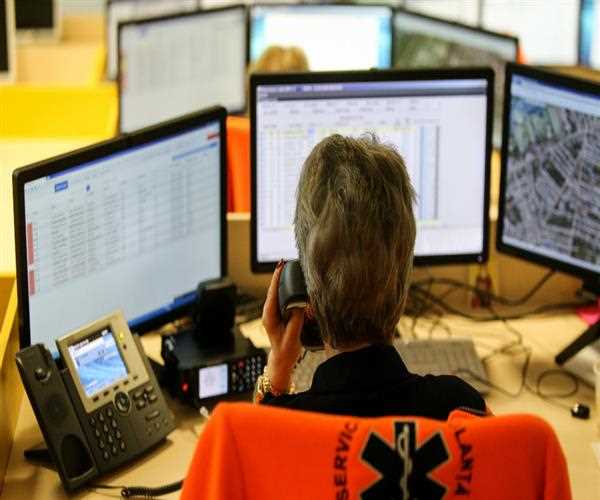
04-Aug-2023 , Updated on 8/4/2023 5:49:40 AM
Why 911 call center workers are overworked and undertrained
Highlights
- High Stress Environment- 911 call center workers operate in an extremely high-stress environment, often dealing with life-and-death situations on a daily basis.
- Overwhelming Workload- The demand for emergency services has increased significantly over the years, leading to an overwhelming workload for call center operators.
- Understaffing- Many call centers are understaffed, forcing existing workers to handle a larger number of calls, which can lead to burnout and decreased quality of service.
- Lack of Training- Call center operators often receive limited training in handling the complex and diverse range of emergencies they encounter. This can result in inadequate responses or delays in providing assistance.
- Mental Health Impact- Constant exposure to traumatic incidents can take a toll on the mental health of call center workers, leading to conditions like PTSD, anxiety, and depression.
The 911 emergency call center is the backbone of public safety, serving as the primary lifeline between citizens in distress and the appropriate emergency responders. These dedicated professionals play a critical role in ensuring timely and effective responses to a wide range of emergencies, from medical crises to fires and criminal incidents. However, despite their crucial role, many 911 call center workers find themselves caught in a relentless cycle of overwork and insufficient training, raising concerns about the quality of service they can provide and the impact on both their mental well-being and public safety.
The Nature of the 911 Call Center Job
Working in a 911 call center is a demanding and high-pressure job that requires quick thinking, clear communication, and the ability to remain calm in chaotic situations. Call takers and dispatchers must accurately assess the situation based on often incomplete and frantic information provided by callers. They must then relay this information to the appropriate emergency responders, making split-second decisions that can be a matter of life and death.
Overworked and Understaffed
One of the central issues facing 911 call center workers is the chronic problem of overwork and understaffing. Emergency call centers often grapple with high call volumes that far exceed their capacity to handle efficiently. During peak hours or major incidents, call takers and dispatchers may find themselves inundated with a continuous stream of calls, leaving them with little time to recover between emergencies. This constant pressure can lead to exhaustion, burnout, and a decrease in the quality of service provided.
Overworked employees face a multitude of challenges. Extended shifts, overtime, and lack of breaks contribute to physical and mental fatigue. Prolonged periods of high stress and inadequate rest not only affect employee morale but also compromise their ability to make accurate decisions and provide effective assistance to callers. Moreover, the stress and exhaustion experienced by overworked call center workers can negatively impact their overall health and well-being, leading to long-term health problems .
Lack of Comprehensive Training
Another critical issue is the inadequate training provided to 911 call center workers. Effective emergency response relies on well-prepared and knowledgeable call takers and dispatchers who can quickly assess situations and provide appropriate guidance. Unfortunately, many call center workers report insufficient training that fails to adequately prepare them for the diverse array of emergencies they might encounter.
Training for 911 call center workers should encompass a wide range of scenarios, including medical emergencies, fires, criminal incidents, and natural disasters. It should also address communication techniques for dealing with distressed callers, cultural sensitivity , and effective collaboration with different agencies. However, due to budget constraints, time limitations, or outdated training programs, many call center workers receive only basic training that may not adequately equip them to handle the complexities of their job.
The Consequences
The consequences of overworked and undertrained 911 call center workers can be far-reaching and concerning. Inaccurate assessments, miscommunication, and delayed responses can lead to tragic outcomes. Lives can be lost or endangered due to errors that could have been prevented with proper training and support.
Public Safety Concerns
When call center workers are undertrained, there is an increased risk of inadequate response times and incorrect actions taken during emergencies. Miscommunication between call takers and dispatchers, or the inability to assess a situation accurately, can result in delayed assistance reaching those in need. Such delays can have devastating consequences, particularly in critical situations like heart attacks, accidents, or incidents of violence.
Psychological Toll on Workers
The toll of overwork and insufficient training is not limited to public safety concerns alone. The mental health and well-being of 911 call center workers are equally at stake. Constant exposure to distressing and traumatic situations, coupled with the pressure to make rapid decisions, can lead to emotional exhaustion, anxiety, and even post-traumatic stress disorder (PTSD). The lack of proper coping mechanisms and support systems further exacerbates these issues.
Addressing the Challenges
Recognizing the importance of 911 call center workers and the critical role they play in public safety, it is imperative to address the challenges of overwork and inadequate training.
Investment in Training Programs
Emergency call centers must prioritize ongoing, comprehensive training for their staff. Training should be updated regularly to reflect the latest protocols, technological advancements, and best practices in emergency response. Adequate investment in training can equip call center workers with the skills and knowledge needed to handle a diverse range of emergencies effectively.
Staffing and Workload Management
Addressing overwork and understaffing requires a multi-faceted approach. Call centers should consider hiring additional personnel to manage peak call volumes. Implementing shift rotations and providing regular breaks can also help mitigate the physical and mental strain on workers. By ensuring reasonable work hours and manageable workloads, call center workers can maintain their focus and provide better service to callers.

Mental Health Support
Given the inherently stressful nature of the job, call center workers should have access to mental health resources and support. Regular check-ins, counseling services, and opportunities for debriefing after challenging calls can help workers process their emotions and cope with the demands of their role.
Technological Advancements
Advancements in technology can significantly enhance the efficiency of call centers and alleviate the burden on call takers and dispatchers. Implementing intelligent call routing, location tracking, and data-sharing tools can streamline the process of gathering information and dispatching responders, allowing call center workers to focus on critical decision-making.
The challenges of overwork and inadequate training faced by 911 call center workers are critical issues that demand urgent attention. These dedicated professionals are at the frontline of emergency response, and their well-being and preparedness directly impact public safety. By investing in comprehensive training, managing workloads, and providing robust mental health support, we can ensure that call center workers are equipped to handle emergencies effectively, minimize errors, and ultimately save lives.

SEO and Content Writer
I am Drishan vig. I used to write blogs, articles, and stories in a way that entices the audience. I assure you that consistency, style, and tone must be met while writing the content. Working with the clients like bfc, varthana, ITC hotels, indusind, mumpa, mollydolly etc. has made me realized that writing content is not enough but doing seo is the first thing for it.
Join Our Newsletter
Subscribe to our newsletter to receive emails about new views posts, releases and updates.
Copyright 2010 - 2026 MindStick Software Pvt. Ltd. All Rights Reserved Privacy Policy | Terms & Conditions | Cookie Policy